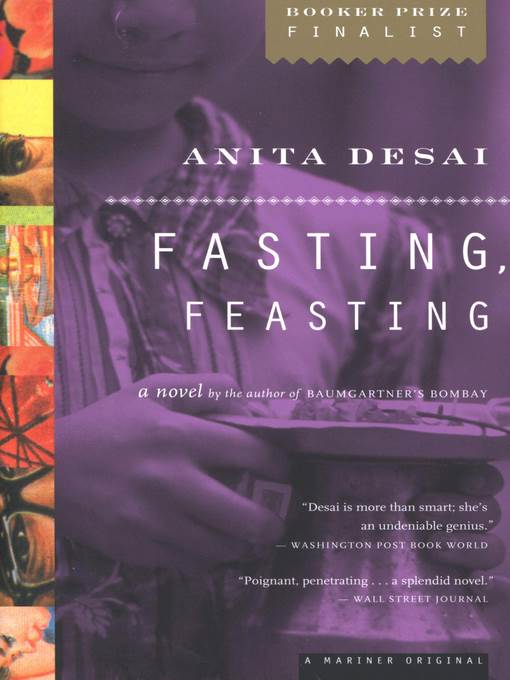
Fasting, Feasting
A Novel
کتاب های مرتبط
- اطلاعات
- نقد و بررسی
- دیدگاه کاربران
نقد و بررسی

Starred review from January 3, 2000
Short-listed for the 1999 Booker Prize, Desai's stunning new novel (after Journey to Ithaca) looks gently but without sentimentality at an Indian family that, despite Western influence, is bound by Eastern traditions. As Desai's title implies, the novel is divided into two parts. At the heart of Part One, set in India, is Uma, the eldest of three children, the overprotected daughter who finds herself starved for a life. Plain, myopic and perhaps dim, Uma gives up school and marriage, finding herself in her 40s looking after her demanding if well-meaning parents. Uma's younger, prettier sister marries quickly to escape the same fate, but seems dissatisfied. Although the family is "quite capable of putting on a progressive, Westernized front," it's clear that privileges are still reserved for boys. When her brother, Arun, is born, Uma is expected to abandon her education at the convent school to take care of him. It is Arun, the ostensibly privileged son, smothered by his father's expectations, who is the focus of the second part of the novel. The summer after his freshman year at the University of Massachusetts, Arun stays with the Pattons, an only-too-recognizable American family. While Desai paints a nuanced and delicate portrait of Uma's family, here the writer broadens her brush strokes, starkly contrasting the Pattons' surfeit of food and material comforts with the domestic routine of the Indian household. Indeed, Desai is so adept at portraying Americans through Indian eyes that the Pattons remain as inscrutable to the reader as they are to Arun. But Arun himself, as he picks his way through a minefield of puzzling American customs, becomes a more sympathetic character, and his final act in the novel suggests both how far he has come and how much he has lost. Although Desai takes a risk in shifting from the endearing Uma to Arun, she has much to say in this graceful, supple novel about the inability of the families in either culture to nurture their children.

January 2, 2000
Here, Booker Prize finalist Desai (writing, MIT) presents a cultural comparision of two cultures and two siblings. Uma, the eldest daughter of an Indian family, has returned to her childhood home after a failed marriage and is destined to serve as the caretaker for her elderly, cantankerous parents. Arun, the cherished and unexpected son, is studying, a world away, in America and spending the summer with the Pattons, a typical suburban family. Desai divides her narrative into two parts. The first part tells Uma's story - as her parents sabotage her every move for independence. Then, using a subtle irony, Desai moves into the second part, contrasting the sights and sounds of India with Arun's experiences in suburban America. Desai manages to present the sterotypical suburban Patton family with enough humor to make the characters real and the emotions they evoke believable. Recommended for all libraries.-Dianna Moeller, OCLC/WLN Pacific Northwest Svc. Ctr., Lacey, WA

Starred review from December 15, 1999
Renowned Indian writer Desai has had three novels shortlisted for the Booker Prize, including her newest, a superbly crafted tale about the tyranny of family and class. In the opening scene, Uma, a plain, self-effacing yet soulful woman, waits on her bossy, unloving, provincial parents. Desai then turns back the clock to when Uma and her sister, Aruna, lost status with the arrival of Arun, a much younger brother. An enthusiastic but mediocre student, Uma is made to stay home and care for the little prince, while her wilier sister bides her time, determined to escape. The girls come of age; marriage proposals are pursued; Aruna makes her getaway to Bombay; and hapless Uma, the victim of dowry scams, is condemned to the ignoble half-life of spinsterhood. Arun, meanwhile, fares no better. A gentle boy, he is forced to study day and night to satisfy his parents' ambitions, then is hustled off to college in far-away Massachusetts, where he is shocked and saddened by the unexpected misery he finds amidst material wealth. As Desai charts the fate of each sibling in this brilliantly understated drama of manners, she explores the many forms oppression takes. Variations on the old saying, "It's either feast or famine," lead to devastating insights into the failures of parents and the shortcomings of religion and yield a striking contrast between East and West. Desai has been compared to Jane Austen, and, indeed, she is a deceptively gracious storyteller, writing like an embroiderer concealing a sword as she creates family microcosms that embody all the delusions and cruelties of society-at-large. ((Reviewed December 15, 1999))(Reprinted with permission of Booklist, copyright 1999, American Library Association.)

























دیدگاه کاربران